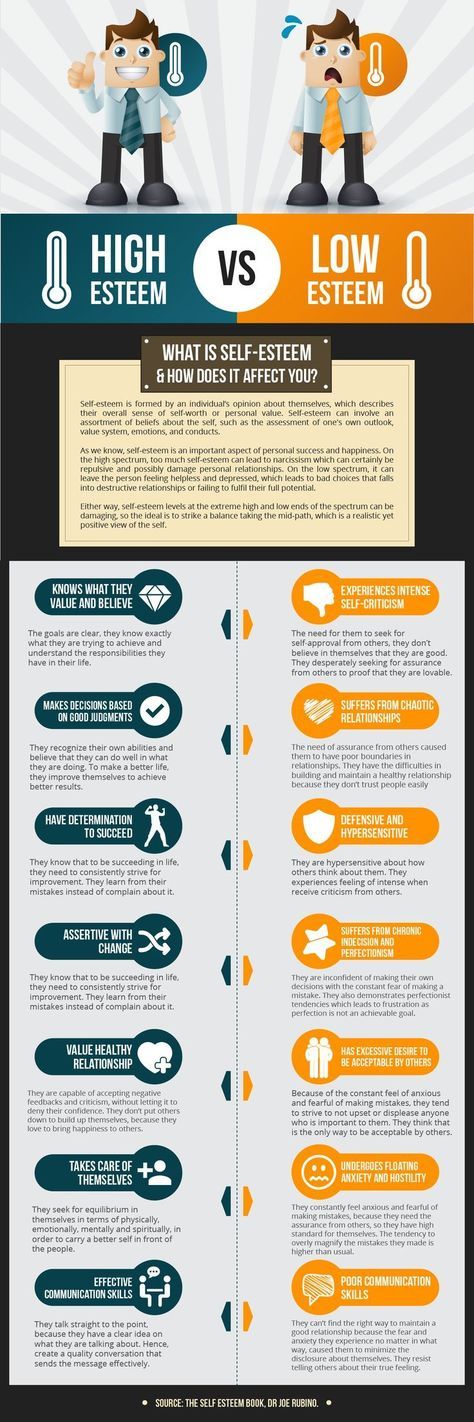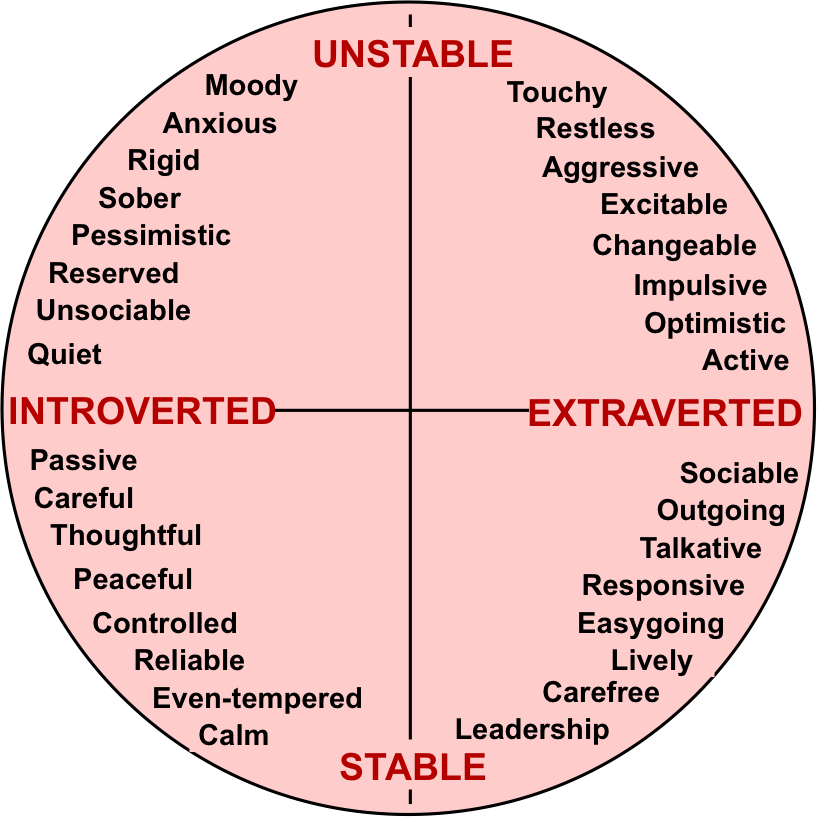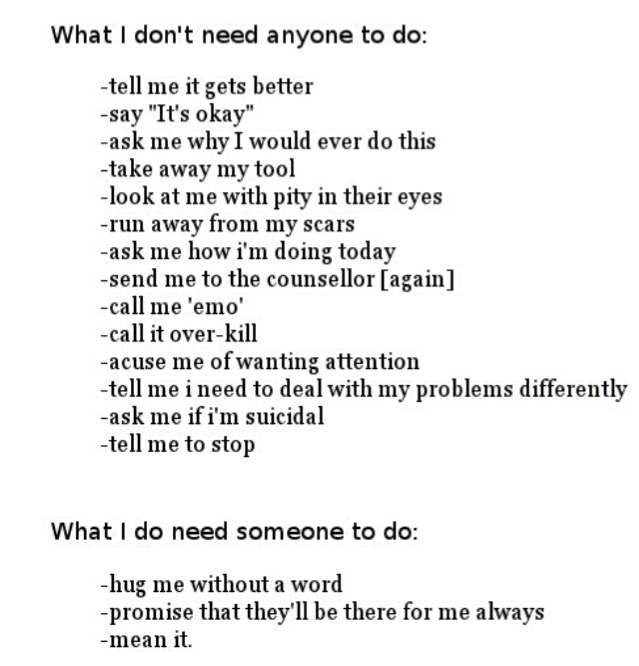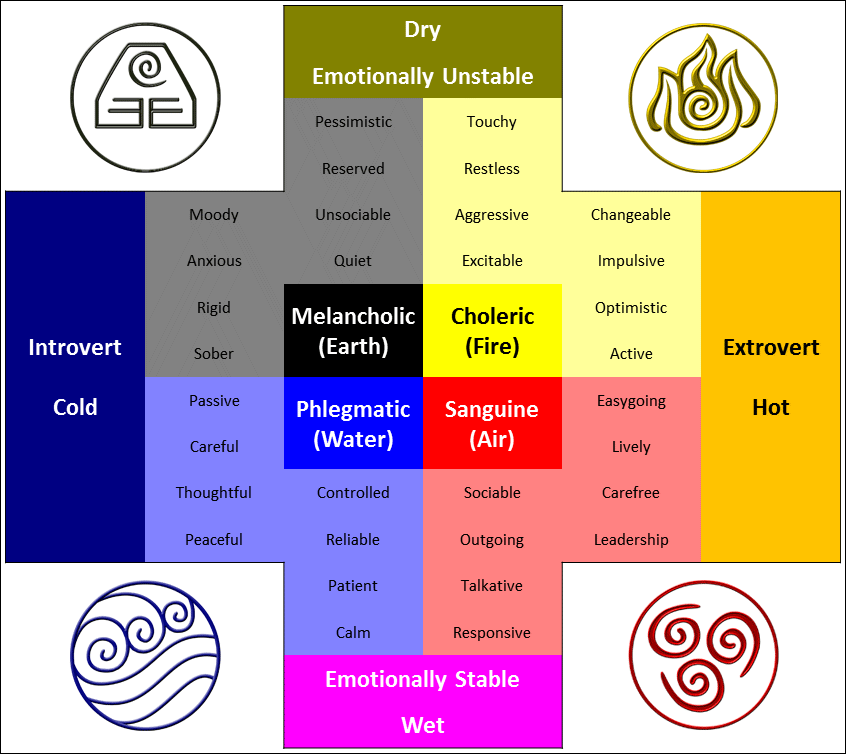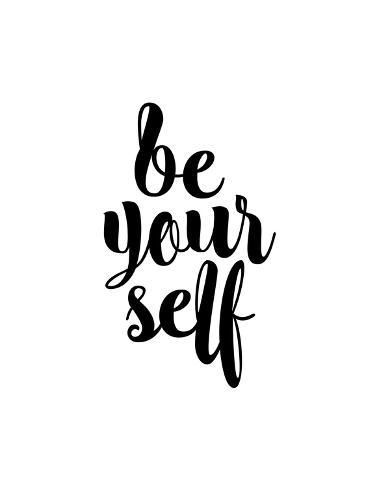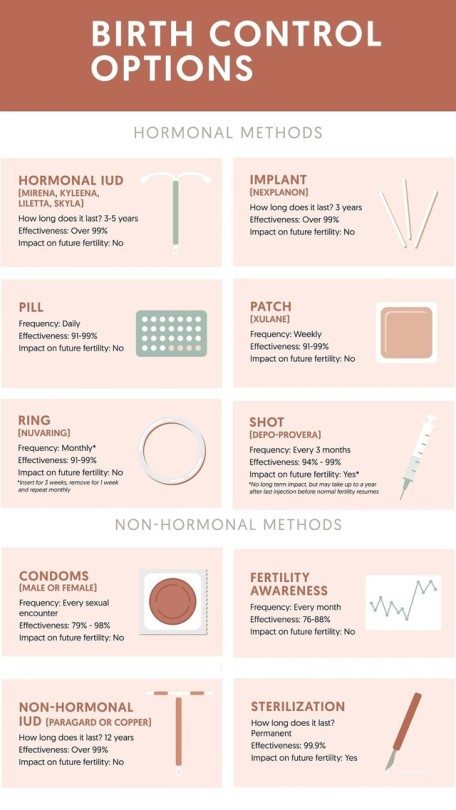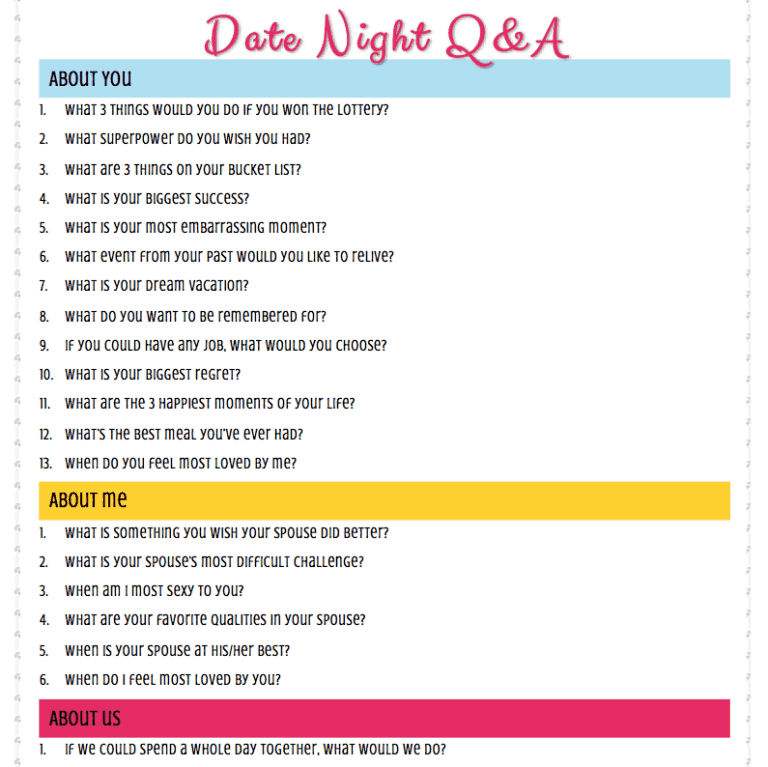How to create healthy boundaries in relationships
How to Set Healthy Boundaries in Your Relationship
September 3, 2020
Given the current state of the world, you may be spending more time than ever with your partner. If you find that you are together a lot, it may not always be easy to set necessary boundaries. Perhaps you have already set healthy boundaries for your relationship, but they have been hard to maintain during this time. Setting boundaries (or reevaluating them) in your relationship will ultimately help reduce stress and ensure that you have a healthy dynamic with your partner.
Here are six tips for setting healthy boundaries in your relationship:
Know That Boundaries Are Healthy for Your RelationshipBefore setting boundaries, consider acknowledging
why they are important for you. Boundaries are an integral part of healthy relationships because they help to maintain a balance between you and your partner. They also help minimize conflict, because they establish a precedent for what you both expect from each other. Having boundaries can actually bring you closer to your partner because they are set through open communication.
Communicating transparently is an important part of every healthy relationship. When discussing boundaries with your partner, being honest about what you are comfortable with or not comfortable with will ensure that they know what you truly expect from them. You could even try writing down your expectations so that you are clear about what you want when sharing them with your partner.
Listen to What Your Partner NeedsSince you expect your partner to honor your boundaries, it’s also important to fully listen to their needs as well. Relationships are a two-way street, so you will need to listen to the boundaries they want to set and discuss those as well. Remember, that in a relationship, you should be able to say anything, but the WAY you say it, matters. Consider reading up on soft startups to communicate more effectively.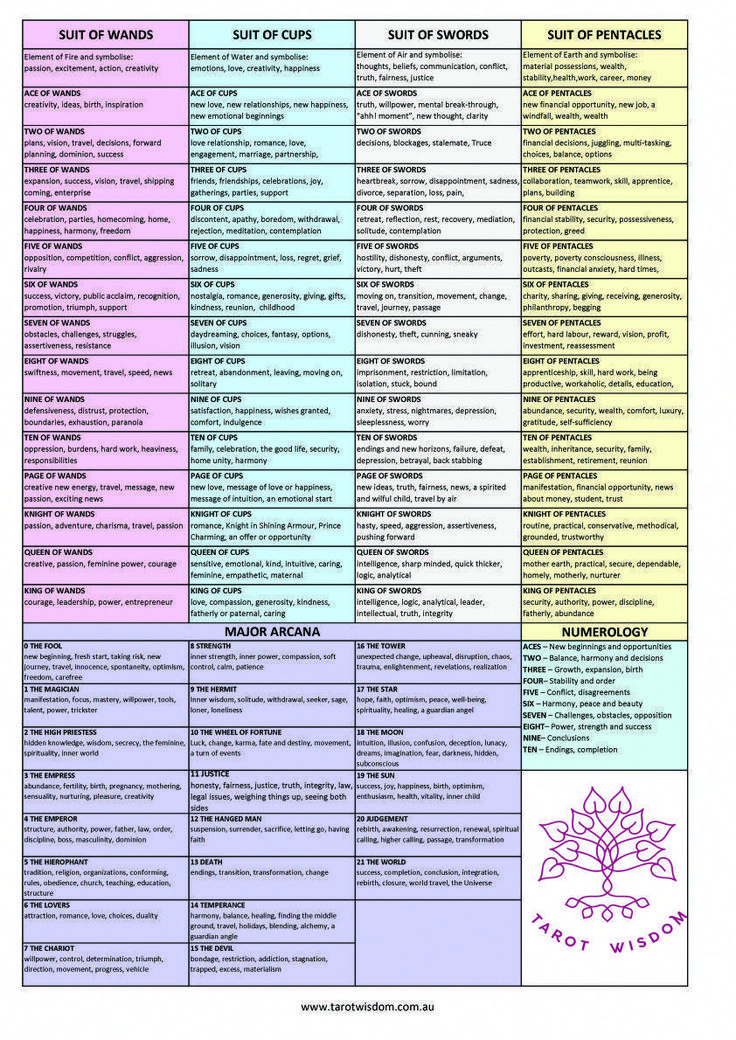
This tip is especially applicable at the moment. If you’re spending a lot of time together right now, be sure to communicate with each other about when you need time alone. It’s just as important to set aside time for yourself as it is to have quality time with the person you love.
Establish How Comfortable You Are In the Scope of COVID-19Your boundaries surrounding your interactions with friends and family, and your overall social expectations during this time, are likely to have changed. If you haven’t already, consider having a conversation with your partner about how comfortable you both are with being around other people during this time and in what type of setting.
Communicate With RespectHealthy relationships include respect from both sides. The best way to communicate your boundaries with your partner is with compassion, understanding and respect for each other’s expectations.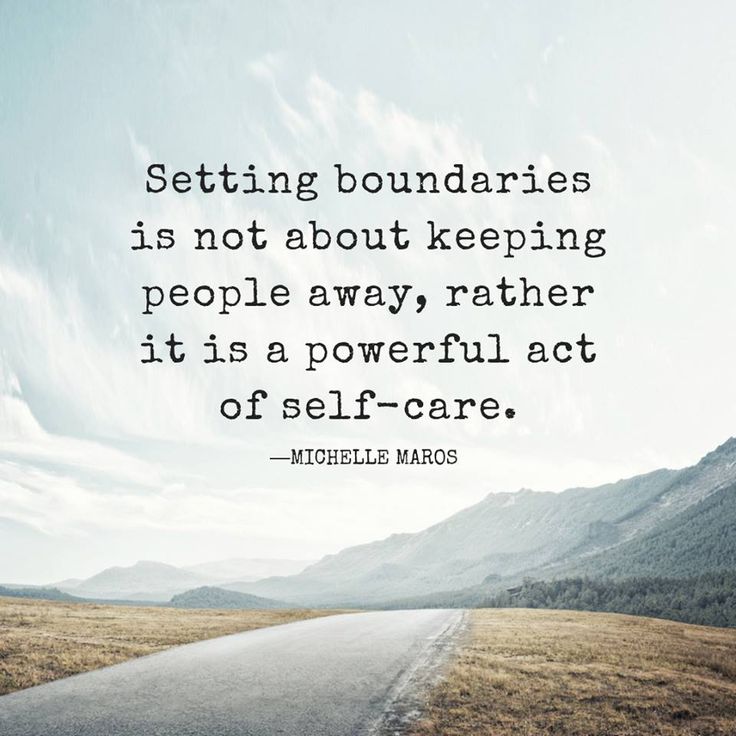 Having respect each time you communicate will ultimately make your relationship healthier and stronger.
Having respect each time you communicate will ultimately make your relationship healthier and stronger.
COVID-19 and Relationships
Expressing Feelings in a Relationship
Cheers to Healthy Relationships
Tips for Saving Your Relationship
If you would like to begin Relationship Enhancement Counseling, request an appointment with Eugene Therapy today.
Setting Healthy Boundaries in Relationships
love & friendship
Whether you’re dealing with romantic partners, family, friends, or coworkers, maintaining healthy boundaries can help you strengthen relationships, avoid unhealthy connections, and improve your self-esteem and overall well-being.
What are healthy boundaries?
You might hear the word “boundaries” and imagine walls that separate you from other people. In a sense, that’s true. But boundaries aren’t necessarily a bad thing. In fact, they’re an important ingredient in healthy, balanced relationships.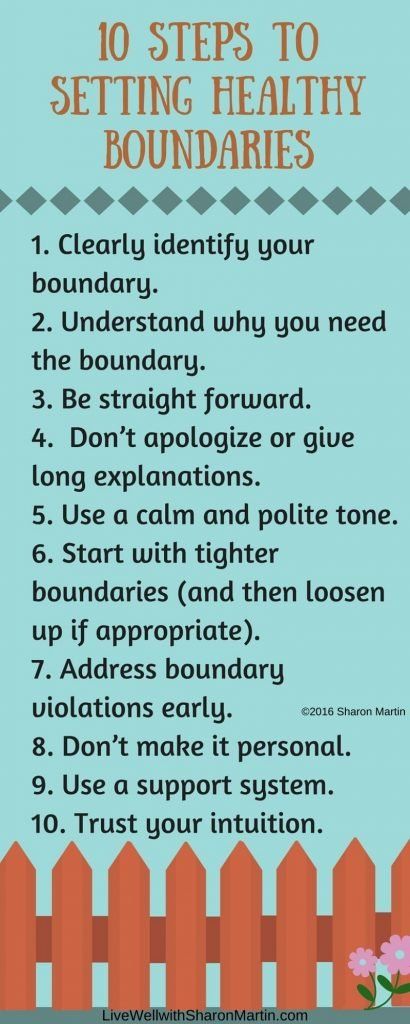 They're also a crucial part of maintaining your identity, mental health, and physical well-being.
They're also a crucial part of maintaining your identity, mental health, and physical well-being.
Boundaries can include restrictions on physical actions, such as asking a roommate or partner not to look through your phone or not to interrupt when you’re working from home. They can also be psychological, such as asking your spouse to accept that your goals and dreams may not always be the same as theirs.
Healthy boundaries serve to:
- Encourage autonomy and reduce codependent habits.
- Set expectations when interacting with others.
- Give you a sense of empowerment and self-respect.
- Ensure your physical and emotional comfort.
- Clarify individual responsibilities in a relationship.
- Separate your wants, needs, thoughts, and feelings from those of others.
Without healthy boundaries, your relationships can become toxic and unsatisfying and your well-being can suffer. You might feel taken advantage of if a friend keeps asking for money, for example, or feel overwhelmed by stress if you feel the need to solve all of your partner’s emotional problems. Or if a parent continually invades your privacy, you’ll likely feel resentful. Similarly, if you continually ignore another person’s boundaries, you risk making them feel uncomfortable and damaging the relationship.
Or if a parent continually invades your privacy, you’ll likely feel resentful. Similarly, if you continually ignore another person’s boundaries, you risk making them feel uncomfortable and damaging the relationship.
Boundaries aren’t just necessary in your personal relationships, though. They’re also needed in the workplace, where coworkers or managers might monopolize your time or disregard your needs. Unhealthy boundaries at work can also follow you home and reduce the quality of your personal life.
One study showed that when boundaries are blurred between personal life and work, people experience more emotional exhaustion and less happiness. On the other hand, setting boundaries, particularly when it comes to job duties, can lead to a greater sense of empowerment.
Learning how to set and maintain boundaries can change many aspects of your life, ranging from work to family relations to dating. It all starts with understanding the difference between healthy and unhealthy boundaries.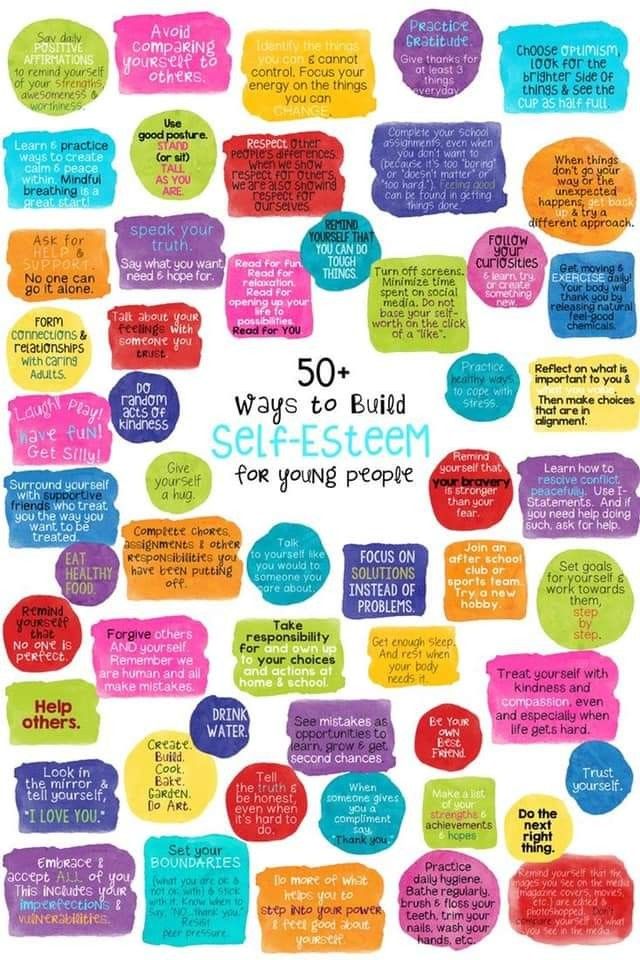
With over 25,000 licensed counselors, BetterHelp has a therapist that fits your needs. It's easy, affordable, and convenient.
GET 20% OFF
Online-Therapy.com is a complete toolbox of support, when you need it, on your schedule. It only takes a few minutes to sign up.
GET 20% OFF
Teen Counseling is an online therapy service for teens and young adults. Connect with your counselor by video, phone, or chat.
GET 20% OFF
Types of healthy boundaries
Personal boundaries can come in many forms. However, not every relationship requires you to address every type of boundary. For example, you might need to set physical restrictions with a coworker but not financial ones.
Physical boundaries help keep you comfortable and safe, not just when you’re dealing with strangers, but also when you’re interacting with those closest to you. For example, you might tell someone that you’d prefer handshakes instead of hugs. Or you could tell a friend that you need to take a rest during a lengthy bike ride. If a physical space belongs to you, you can set limitations around that as well. Perhaps you don't want someone to intrude in your bedroom or clutter your office with their items.
If a physical space belongs to you, you can set limitations around that as well. Perhaps you don't want someone to intrude in your bedroom or clutter your office with their items.
Sexual boundaries could involve anything from asking for consent before being physically intimate to checking in with your partner’s comfort level during sex. Even if you’ve been with your partner for years, you should make an ongoing habit of communicating your preferences. You might want to reassess limitations and expectations surrounding things like frequency of sex and contraception use.
Emotional boundaries ensure that others are respectful of your emotional well- being and internal comfort level. When setting an emotional boundary, you might say something like, “I don't want to talk about this subject while I'm at work because I need to focus.” You might also use these barriers to prevent yourself from feeling overwhelmed by other people’s feelings. For example, you can acknowledge you’re not responsible for how another person reacts to your decision to turn them down for a second date.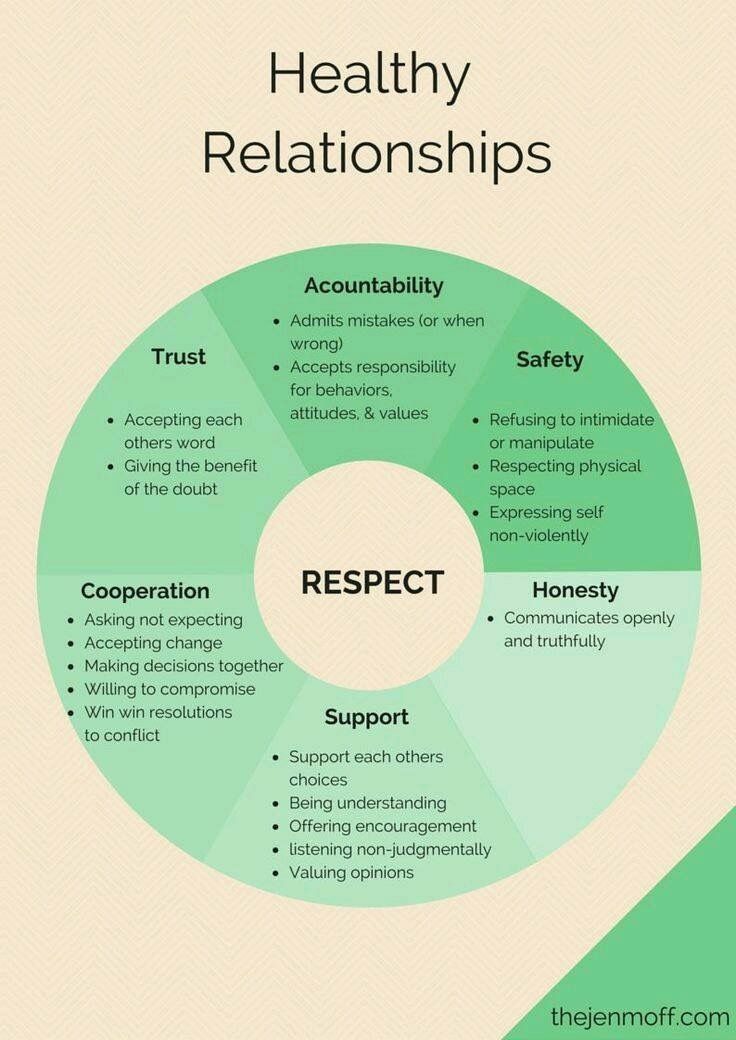
Material/financial boundaries extend to your belongings, such as money, clothing, car, or home. If you’re a charitable person, you might have a hard time saying “no” to people who want to borrow items. However, people may intentionally or unintentionally take advantage of your goodwill, and then you may notice your own resentment building. When setting a material restriction, you might say something like, “You can borrow my phone charger, but please put it back when you’re done” or “No, I can’t loan you money for new shoes.”
[Read: Coping with Financial Stress]
Time boundaries allow you to focus on your priorities at work and in your personal life without feeling crowded by other people’s needs and wants. Imagine that you’ve had a stressful work week and want to spend the weekend recuperating. You might decline a party invite or set a limit on how long you’ll be there. Other time-related restrictions could include asking a friend to avoid calling you during work hours or asking a partner to delay an important conversation until a more convenient time.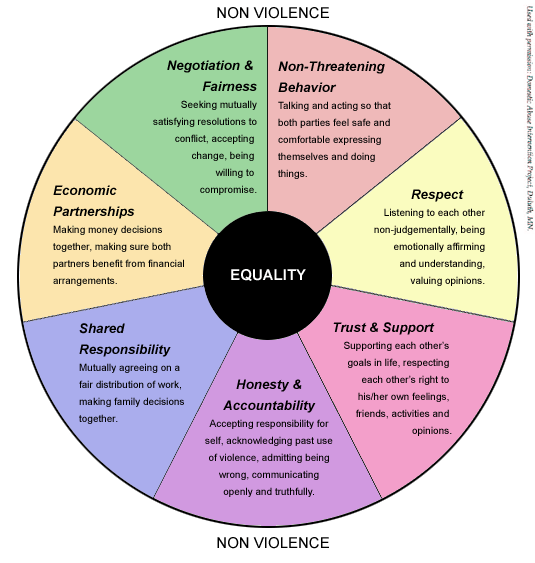
Shifting boundaries
Boundaries aren’t etched in stone. You’ll need to adjust them as circumstances change and relationships grow. This can be especially true in long-term relationships. Communication is important as you reevaluate and revise your boundaries. You want the other person to be clear on the change and the reason behind it.
| Examples of shifting boundaries | |
| Initial boundary | New boundary |
| You initially have loose financial boundaries with family members and help them pay bills when necessary. | You lost your job, so you decide to set tighter boundaries to protect your financial well-being. |
| You often agree to work extra weekend hours to help a coworker. | You cut back on hours so you can spend more time with your newborn. |
You allow a friend to vent their emotions to you daily.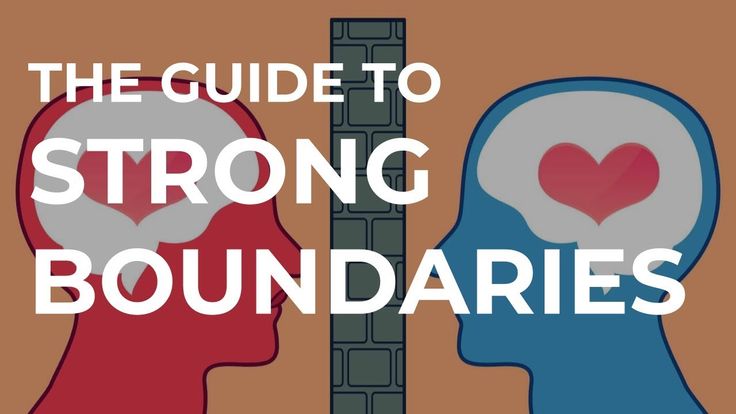 | The oversharing of information affects your mental health, so you set a limit on how often you talk about the subject. |
| You and your partner have sex multiple times a week. | Your sex drive changes, and you ask your partner if the two of you can focus on different forms of intimacy. |
| You allow your brother-in-law to temporarily use your garage for storage. | You need the space for your own needs, so you talk to him about relocating his items. |
Unhealthy boundaries
Unhealthy boundaries often tend to be either too rigid or too porous. Healthy ones fall somewhere between these two extremes.
- Rigid boundaries keep other people at a distance, even loved ones. Maybe you refuse to talk about your emotions with your partner or rarely set aside time to meet with friends.
- Porous or weak boundaries develop when you have a hard time saying “no” to others.
 For example, you might be too willing to take on all the responsibilities in a relationship. Or maybe you tend to overshare when talking with strangers.
For example, you might be too willing to take on all the responsibilities in a relationship. Or maybe you tend to overshare when talking with strangers.
There are many reasons why people may consistently struggle with unhealthy boundaries, such as:
Desire for control. Some people use boundaries to manipulate others. For example, a person might use rigid boundaries to stonewall conversations, refusing to engage with you until you do what they want.
Fear of rejection. If you’re afraid of a romantic partner walking out of your life because of your flaws, you might hesitate to be emotionally open with them.
Lack of experience with setting limitations. If you grew up surrounded by people who set poor personal boundaries, managing proper ones can be a challenge. You might think that invading other people’s personal space is normal because your parents and siblings regularly did it to you.
Overly agreeable personality.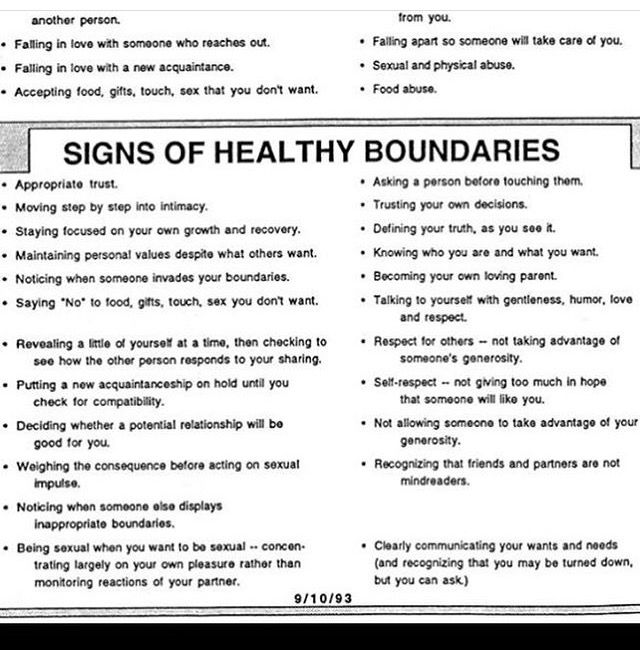 If you’re too eager to please other people, you might allow them to do things that make you uncomfortable. Maybe you regularly overcommit to activities or agree to help people because you simply want to be loved and accepted.
If you’re too eager to please other people, you might allow them to do things that make you uncomfortable. Maybe you regularly overcommit to activities or agree to help people because you simply want to be loved and accepted.
Low self-esteem. You might feel as if your needs and wants aren’t worth vocalizing, or that you don’t have an identity of your own. Instead, you prioritize what other people want. As a result, people fail to recognize your discomfort.
Boundaries and enabling behavior
When someone you love is dealing with addiction, you may need to shift your boundaries to avoid enabling their behavior. Enabling is when you shield someone from the consequences of their actions. For example, you might want to offer to pay their legal bills for a DUI or lie to other people to cover up evidence of a gambling or drug addiction. These kinds of actions may seem helpful in the moment, but you’re actually preventing your loved one from learning from their mistakes.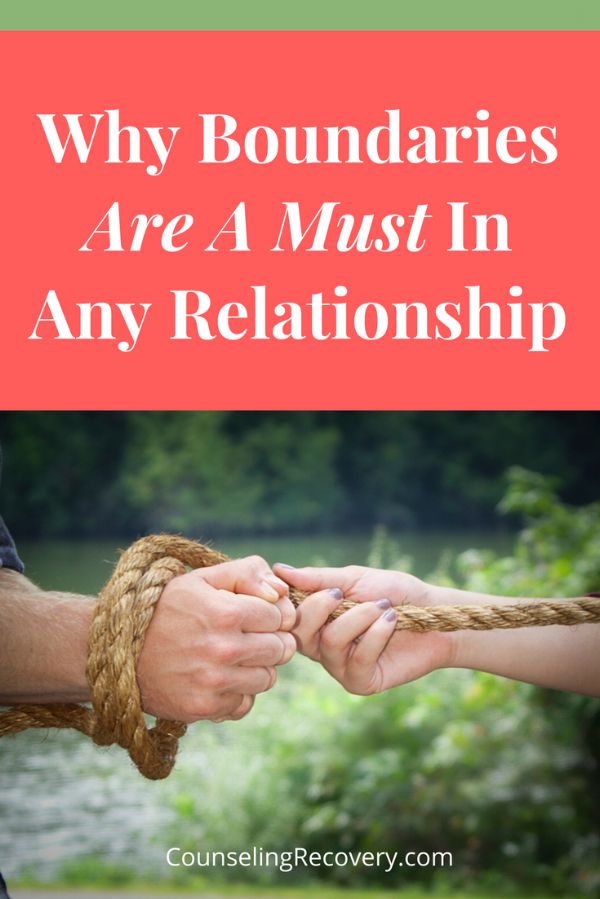
[Read: Helping Someone with a Drug Addiction]
Enabling isn’t limited to situations that involve addiction. It can happen in other mental health issues. For example, if your loved has social anxiety disorder, you may try to shield them from uncomfortable interactions by speaking up for them in pubic. The result is that they continue to rely on you instead of addressing the issue on their own.
How to set and maintain boundaries
While it’s usually best to start setting boundaries early on in a relationship, establishing healthy rules and limitations can help strengthen a relationship at any stage.
In many cases, you may not even realize a certain restriction is needed until you get to know each other more. For example, it might take you some time to realize that a coworker is regularly distracting you while on the job or that a romantic interest seems too controlling.
The following tips can help you establish boundaries if you are experiencing trouble communicating or connecting with a person in your life.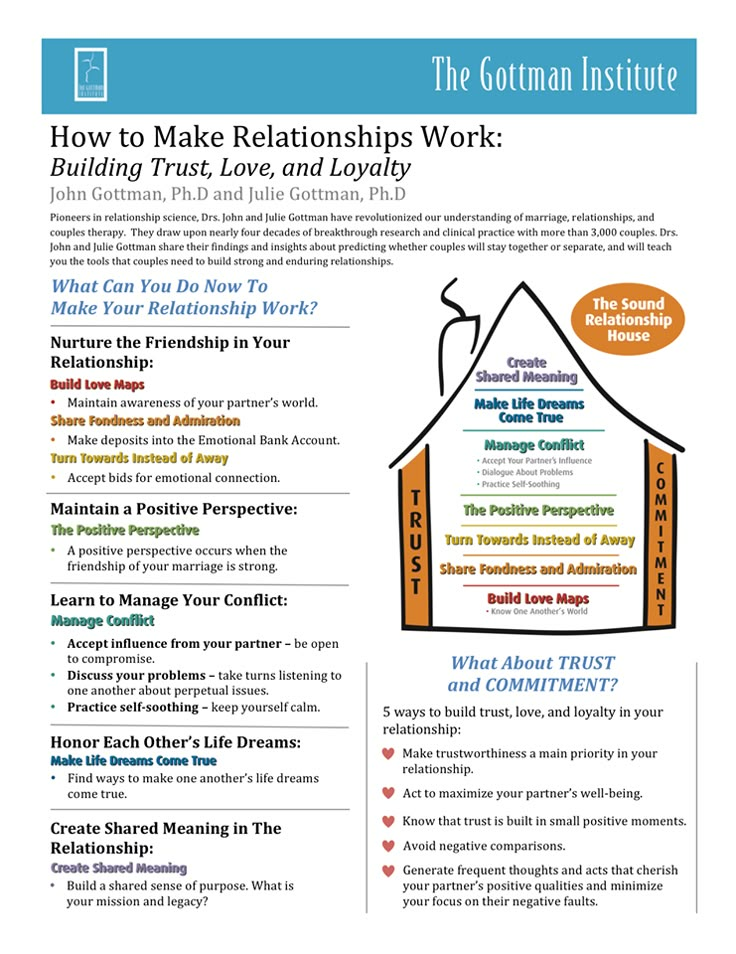
Setting boundaries tip 1: Know what you want in a relationship
Whether the relationship is romantic or platonic, it’s hard to have your needs met if you don’t know what they are. Reflecting on your values and beliefs is a good place to start.
Ask yourself questions like:
- What traits do I like to see in other relationships?
- What behaviors bother me?
- What qualities do I admire in others?
- What material items matter the most to me and why?
- How do I like to spend my time?
- What makes me feel fulfilled?
By gaining a more thorough understanding of yourself, you can begin to imagine the types of boundaries you need. If you know that you value independence, you’ll likely want to set financial rules between you and a partner. If you value high productivity or privacy, you might set physical boundaries with coworkers who tend to wander into your workspace.
Assessing how you feel with someone
Thinking about how others make you feel can also help you identify necessary boundaries. After interacting with other people, reflect on your feelings by asking yourself questions.
After interacting with other people, reflect on your feelings by asking yourself questions.
- Did the other person make jokes or comments that made you feel disrespected?
- Did they do anything that made you physically uncomfortable or unsafe, such as raise their voice in anger?
- Did you feel pressured to do things that didn’t match your values?
- Did you feel overwhelmed by the person’s requests or expectations of
you? - Did you feel as if they were infringing on your sense of control or
infantilizing you?
A moment of reflection can help you decide whether you need to set limitations with the person in the future.
Tip 2: Talk to the person about your needs
Knowing how to effectively communicate your needs to others is important. Rushed conversations, poor wording, and vague requests can make it harder for loved ones to understand and respect your ground rules.
Consider timing. The best time to set a boundary with your partner is when you both feel relaxed and can focus on the conversation.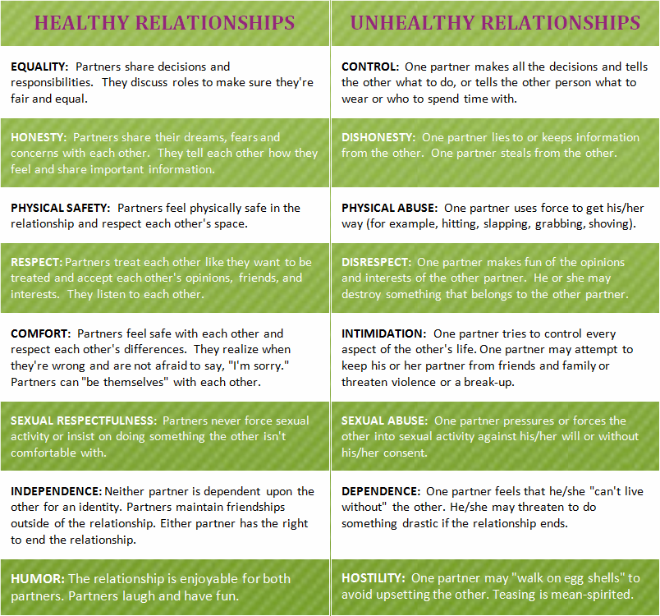 If you’re mid-argument, try cooling down and circling back to the conversation once you’re both calm.
If you’re mid-argument, try cooling down and circling back to the conversation once you’re both calm.
Be prepared. Nervous about discussing your needs? Write your points down before the discussion so that you can speak clearly about your needs.
Consider the delivery. Try to use “I” statements to convey how you feel. Avoid “you” statements, which can seem accusatory. For example, say, “I felt overwhelmed with the amount of work I had to take care of while you were away.” Expressing your emotions is a great way to start laying the groundwork for a relationship boundary.
Be clear. A vague request, such as, “I’d like more personal space” may get the message across, but it’s better to be as clear as possible to avoid confusing the other person. Try, “I feel disrespected and uncomfortable when you come into my room unannounced. Please knock before entering.” A calm but firm tone lets the other person know you’re being serious but not disrespectful.
[Read: Effective Communication]
Address feedback. Depending on the boundary, your partner may have questions for you. Know that you don’t need to justify your needs or explain yourself, but doing so may help the other person understand where you’re coming from. You might even ask follow-up questions to ensure the right message was conveyed.
Feedback in romantic relationships
In romantic relationships, it’s especially important to ask your partner how they feel about a request, rather than guessing. Ask if it seems unfair or unusual to them. Or ask whether it conflicts with something they need or want.
Each of you has your own thoughts and feelings, and each person is responsible for putting these sentiments into words in order to be understood.
Let others take responsibility for their emotions. We often feel naturally inclined to care about how other people feel and react to our words and actions. However, you shouldn’t feel responsible for how the other person reacts to the boundary. For example, they might be upset that you’re asking for more “me time.” This could lead you to feel guilty or selfish. Remind yourself why you’re setting the restriction in the first place: You want some time alone to pursue your separate hobbies and avoid feeling emotionally crowded. Don’t feel you have to disregard your own needs.
For example, they might be upset that you’re asking for more “me time.” This could lead you to feel guilty or selfish. Remind yourself why you’re setting the restriction in the first place: You want some time alone to pursue your separate hobbies and avoid feeling emotionally crowded. Don’t feel you have to disregard your own needs.
Tip 3: Enforce boundaries
Not everyone in your life is going to respect your boundaries all of the time. A partner might accidentally cross one or difficult family members might do so intentionally.
Restate your needs. It’s possible that the other person didn’t understand your original request or simply forgot it. Be calm, firm, and clear about what you need.
Have clear and reasonable consequences for crossing a boundary. If someone has a habit of talking over you, for example, you could say, “I feel disrespected when you talk over me. If you do that again, I'll have to end the conversation.”
Only state consequences that you’re willing to enforce. If you aren’t willing to follow through on a consequence, the other person will feel empowered to overstep your boundaries in the future. For example, if you tell your partner that you’ll take a break from the relationship if they keep lying to you, it’s important to actually follow through on that.
If you aren’t willing to follow through on a consequence, the other person will feel empowered to overstep your boundaries in the future. For example, if you tell your partner that you’ll take a break from the relationship if they keep lying to you, it’s important to actually follow through on that.
How to respond when someone else sets a boundary
You’re not the only one who can set boundaries. When someone voices a restriction, you might feel a sense of shame or frustration. Perhaps you feel like you’re being reprimanded or “put in your place.”
You may notice some negative emotions rushing to the surface as you try to immediately defend your actions. Keep in mind that you are not losing anything but gaining knowledge of what makes the person in your life feel safe and happy.
Take time to breathe and listen. If you’re feeling upset, deep, slow breathing can calm your nervous system’s “fight or flight” response. This makes it easier for you to receive information rather than prepare for an argument.
[Read:Quick Stress Relief]
Accept that the person setting the boundary knows what is best for them. If something truly doesn’t work for you, communicate your needs so that you can both reach a compromise.
Remember that you both have your own way of processing and feeling emotions. Try not to assume what your partner needs before they say it out loud. Allow them space to voice their needs and wants.
Apologize when necessary. You’re only human, and we all make mistakes. Maybe you accidentally overstepped a boundary by making an offensive joke or oversharing when you’ve been asked not to. When someone reiterates the boundary, be humble enough to apologize for your mistake. Ask for clarity if you feel you need it.
By learning to accept and acknowledge other people’s boundaries, you can start to think about how you can improve your own connections with others. Ultimately, effective boundaries can leave you both feeling empowered and result in a healthier, more satisfying relationship.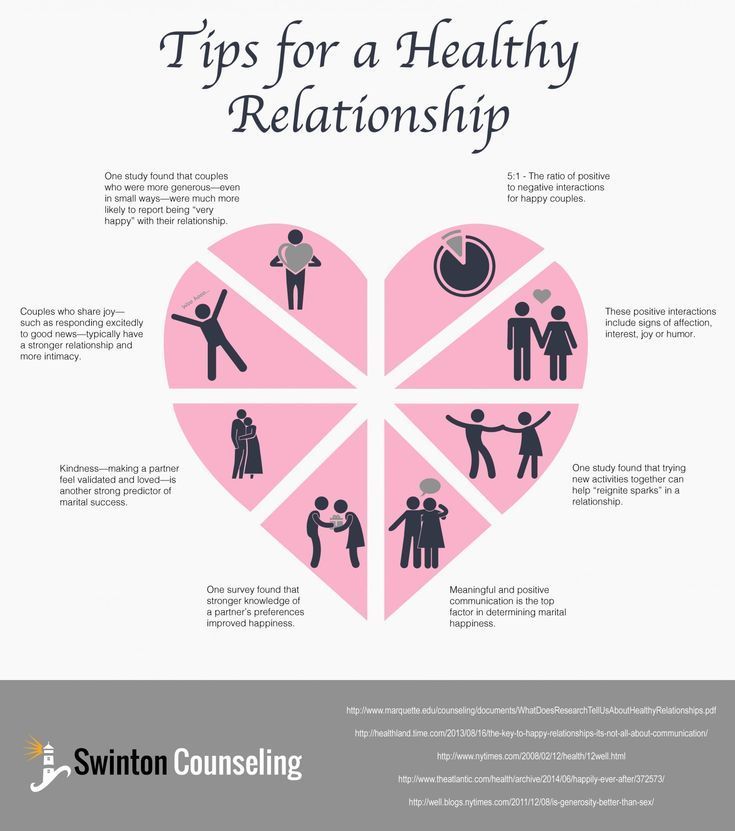
Author: Sheldon Reid.
- References
7 Tips to Create Healthy Boundaries with Others | Psychology Today. (n.d.). Retrieved June 5, 2022, from https://www.psychologytoday.com/us/blog/in-flux/201511/7-tips-create-healthy-boundaries-others
Boundaries: What are they and how to create them | Wellness Center | University of Illinois Chicago. (n.d.). Retrieved June 5, 2022, from https://wellnesscenter.uic.edu/news-stories/boundaries-what-are-they-and-how-to-create-them/
Hornung, S. (2019). Crafting Task and Cognitive Job Boundaries to Enhance Self- Determination, Impact, Meaning and Competence at Work. Behavioral Sciences, 9(12), 136. https://doi.org/10.3390/bs9120136
Pluut, H., & Wonders, J. (2020). Not Able to Lead a Healthy Life When You Need It the Most: Dual Role of Lifestyle Behaviors in the Association of Blurred Work-Life Boundaries With Well- Being.
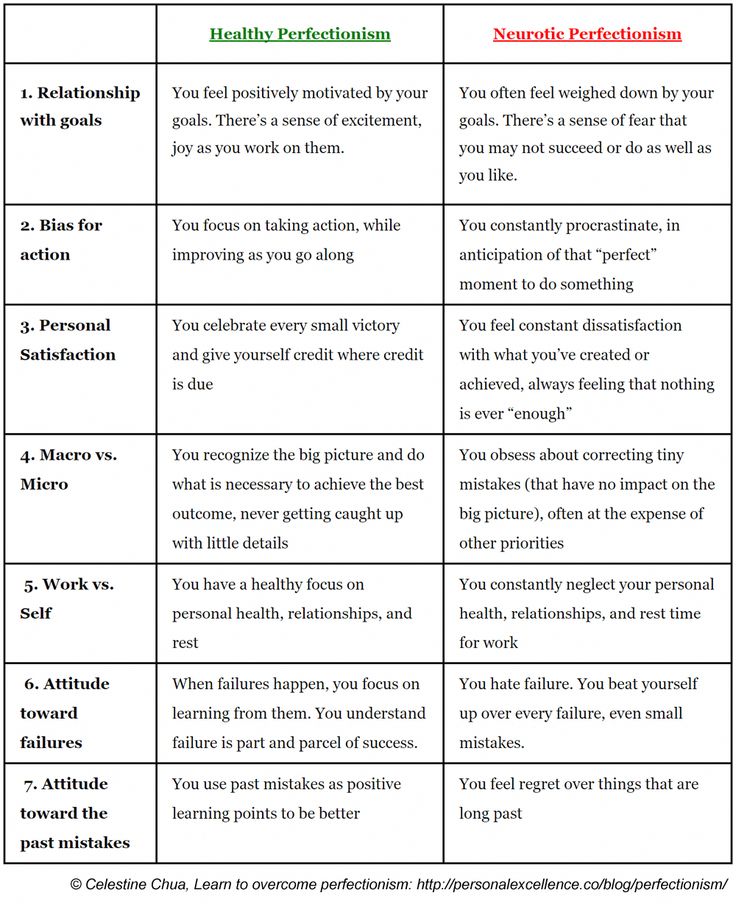 Frontiers in Psychology, 11, 607294. https://doi.org/10.3389/fpsyg.2020.607294
Frontiers in Psychology, 11, 607294. https://doi.org/10.3389/fpsyg.2020.607294When boundaries are crossed—MSU Extension. (n.d.). Retrieved June 5, 2022, from https://www.canr.msu.edu/news/when_boundaries_are_crossed
Boundary Setting Worksheet – Practice crafting “I” statements and other elements of boundary setting. (University of Arkansas)
Boundary Worksheet – Worksheet to practice setting boundaries in different situations. (Pittsburgh Essential Speakers)
Four steps to setting healthy boundaries in your relationship – Tips for setting and maintaining boundaries. (Relate)
Last updated: December 6, 2022
Set Healthy Boundaries: 10 Steps
120,770
Man among men Practices how to
What does it look like? For example, you are talking on Skype with a friend at midnight, because it is more convenient for her. Or give a ride to a colleague who, as soon as he sits down, habitually lights up in your car.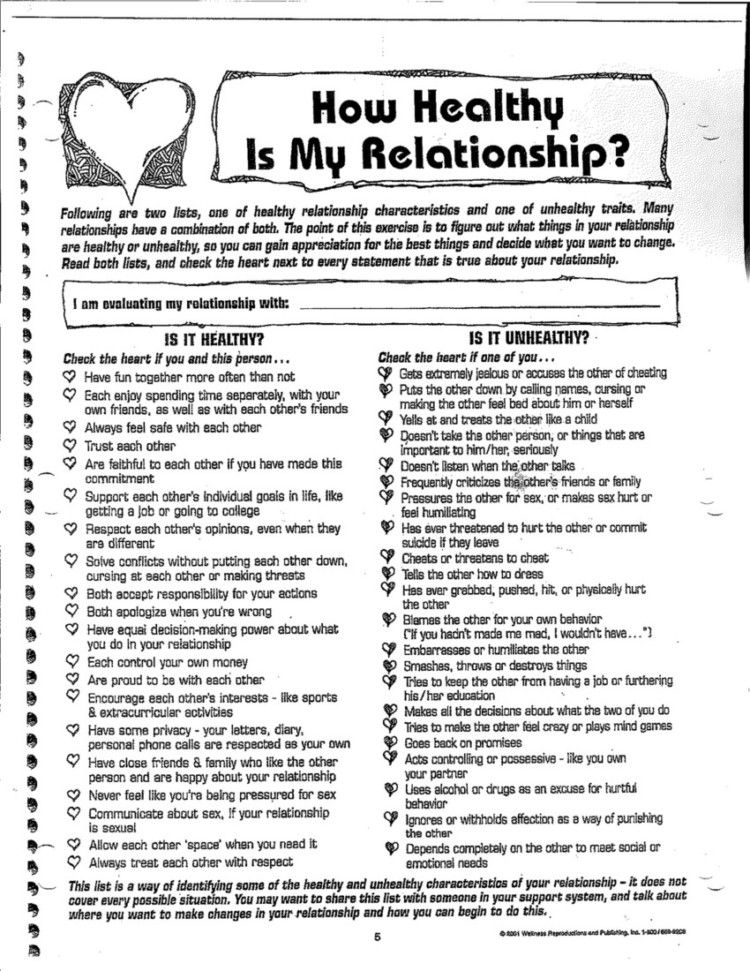
You and your husband are going on vacation to a place where it rains and where pike is great. You don’t even realize that your boundaries are being crossed even when they are taunting you or joking about your size. nine0003
Some of us are reluctant to set clear boundaries because we believe that doing so can offend those around us.
Others set them up in such a way as to stake out part of someone else's territory.
But remember that there is that part of your "I" that needs to be protected from any encroachment, something that belongs only to you. Your emotional health, what you believe in, what you won't let outsiders touch.
What are these boundaries and why are they needed? Most simply they are defined by the words "my business" - "your business". By setting boundaries, we first of all decide for ourselves what behavior towards us will be reasonable and safe for us, will not destroy us as a person. nine0003
They are not designed to get someone to do something. We set them for ourselves, and in this way we show that we are responsible for our own destiny, for what is permissible and what is unacceptable to do in relation to us. But for this you need to know exactly who we are and what our true "I" is.
We set them for ourselves, and in this way we show that we are responsible for our own destiny, for what is permissible and what is unacceptable to do in relation to us. But for this you need to know exactly who we are and what our true "I" is.
We understand where we end and another begins. We are responsible for ourselves and only ourselves. This is where every healthy person starts.
It is almost impossible to manipulate a person who is clearly aware of his personal boundaries and has clearly marked them for others. nine0003
Determine if these boundaries are violated:
Physical boundaries
The very first, basic boundary for us is our skin. Important concepts that define your physical boundaries are physical space and personal space. Ask yourself the following questions to see if your boundaries are being violated by others.
Who is allowed and who is not allowed to touch you and how? What do you consider only your personal space that needs to be protected?
Do you have a place in your house where you can be alone?
Sexual Limits
Find your personal level when sexual activities and touching are comfortable for you.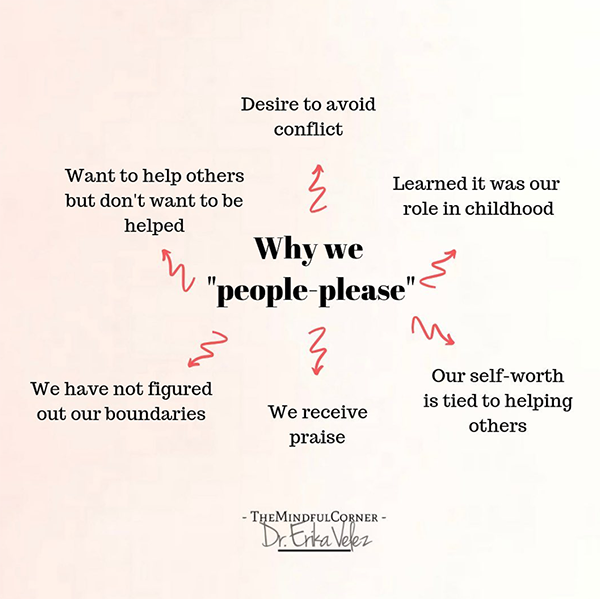 Only you determine what is acceptable and what is not, where, when and with whom. Stick to these boundaries and don't be silent when they are violated.
Only you determine what is acceptable and what is not, where, when and with whom. Stick to these boundaries and don't be silent when they are violated.
Material boundaries
What do you think is permissible and what are not permissible in relation to your property?
What can you give as a gift? Borrow? nine0003
How much money do you allow yourself to borrow? Do you allow strangers to use your car, clothes, apartment? It is only you who determines this, and for different people these boundaries can be very different.
Who enters your house? Who wouldn't you like to see?
The same goes for your children's friends: which rooms in your house are not open to guests?
Do guests take off their shoes? Do they eat and smoke in your car? All these are things that should be determined only by you as the owner of the house. nine0003
Emotional boundaries
You are responsible for your feelings, but others are also responsible for their feelings. Don't let anyone take it out on you or make comments about your weight, appearance, or age. And don't do it yourself. Healthy emotional boundaries keep you from blaming or taking someone else's accusations personally. And also feel guilty for someone's decisions or problems and give unsolicited advice.
Don't let anyone take it out on you or make comments about your weight, appearance, or age. And don't do it yourself. Healthy emotional boundaries keep you from blaming or taking someone else's accusations personally. And also feel guilty for someone's decisions or problems and give unsolicited advice.
A border no one knows about is not a border
If you make excuses and argue or defend yourself, this is also an indicator of weak emotional boundaries. “I’m sad, I’m angry, I’m scared…” Are you able to respond to these feelings of yours immediately and calmly accept them? If you ignore them when they first appear, if you think you shouldn't have these feelings at all, your body will turn up the volume until you hear them.
Spiritual boundaries
What is important to you in life? What do you believe? As in all the previous ones, these boundaries must be felt and realized when they are crossed. nine0003
Intellectual boundaries
Your values, opinions, thoughts.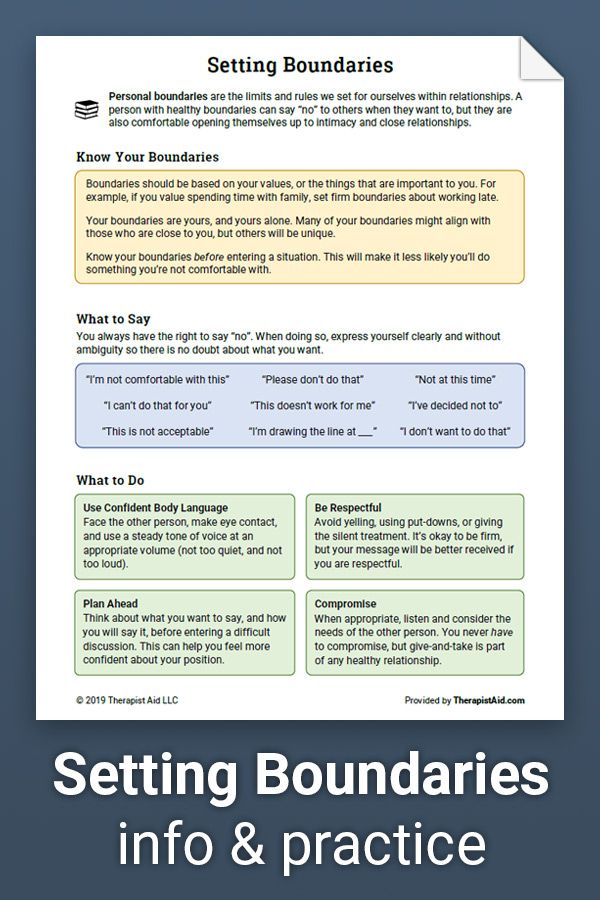 They are only yours. And each individual decides what he wants to share with others, and what to leave unsaid. What do you believe? Can you listen with an open heart to those who express a different opinion, and at the same time without prejudice, without compromising your core beliefs?
They are only yours. And each individual decides what he wants to share with others, and what to leave unsaid. What do you believe? Can you listen with an open heart to those who express a different opinion, and at the same time without prejudice, without compromising your core beliefs?
There are two more things that belong only to you. These are your words and your time.
Remember: "no" is the most basic boundary and a complete, extended sentence. nine0003
Healthy boundaries are not:
- set for us by someone else;
- hurt us;
- are rigid and immovable;
- invade our personality.
10 laws of healthy boundaries
1. All actions have consequences. If someone in your life showed violence, cruelty, selfishness towards you, did you set boundaries? Or does it all happen over and over again with no consequences for them? nine0003
2. The law of responsibility. We answer to each other, but not to each other.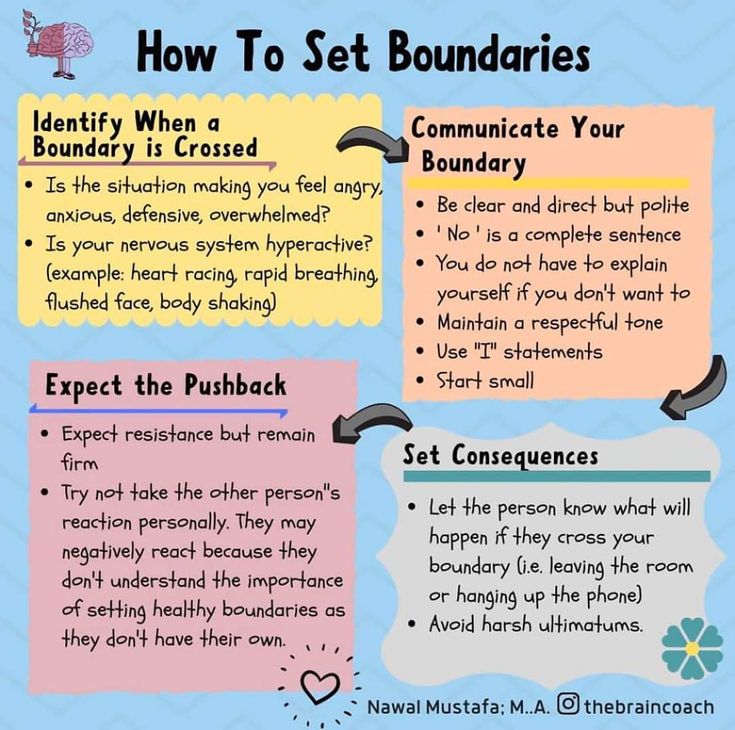 This means not encouraging or provoking anyone's infantile behavior.
This means not encouraging or provoking anyone's infantile behavior.
3. Power has limits. We have power over some things, but we do not have the power to change other people. We only have the power to change our own lives.
4. The law of respect. If we want others to respect our boundaries, we must respect theirs too. nine0003
5. Freedom of choice. We should be free to say "no" or say "yes" with a pure heart. You can’t love a person just because you feel sorry for him and he leaves you no other choice.
6. We need to evaluate the pain of setting our boundaries for others . Do our boundaries cause pain that will then lead to healing and growth? Or the pain that only hurts them?
7. Law of proactivity. We take active steps to solve problems based on our values and desires. Proactive people defend their freedom and express disagreement, but without raising an emotional storm.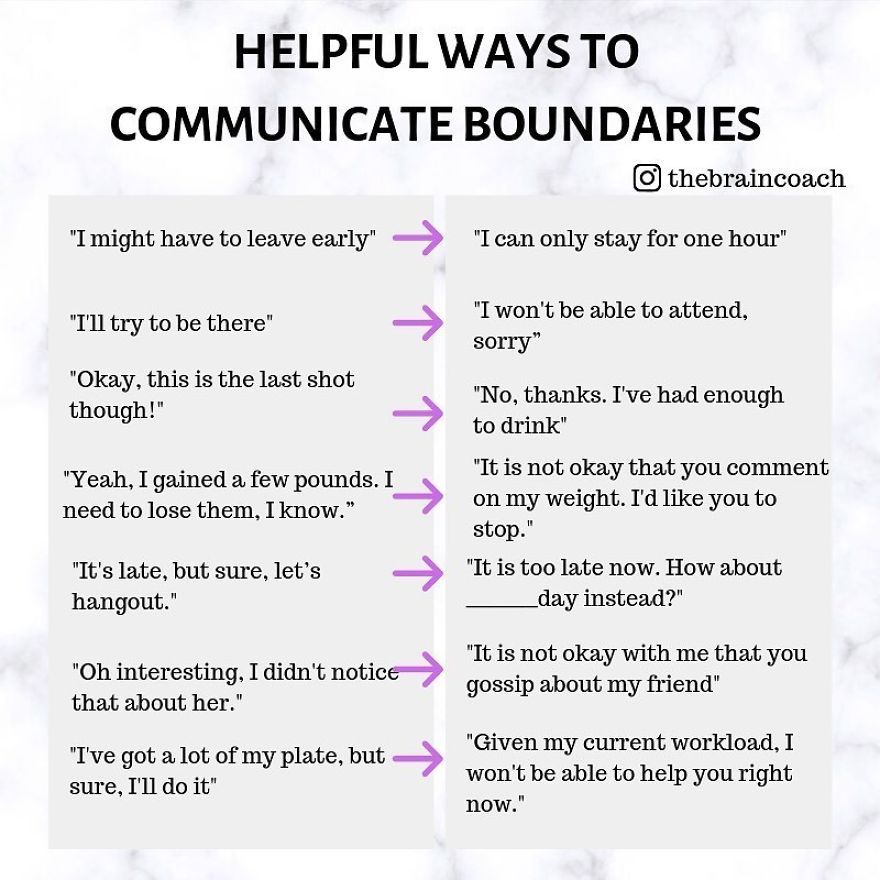 nine0003
nine0003
8. The law of envy. We will never get what we want if we set our limits based on what others have. An envious person simply does not see his boundaries based on the choices that he has.
9. Law of activity . Don't wait for others to make the first move.
10. You need to communicate your boundaries. A border that no one knows about is not a border. We must make it very clear to the other what we want and what we do not want, what we will tolerate and what we will not. We must also make it clear that every violation of boundaries has consequences. nine0003
Text: Maria Malygina Photo Source: Getty Images
New on the site
Why do we have animals instead of children
Test: Who are you at the New Year celebration?
“I become like my tough and distant father. What to do?"
Top 10 Psychologies articles of 2022
Naked people and art: how the image of nudity has changed from era to era
15 questions to help sum up the year - draw the right conclusions
“My husband's parents are not interested in how my pregnancy is progressing”
“My husband left for his mistress, but is in no hurry to get a divorce.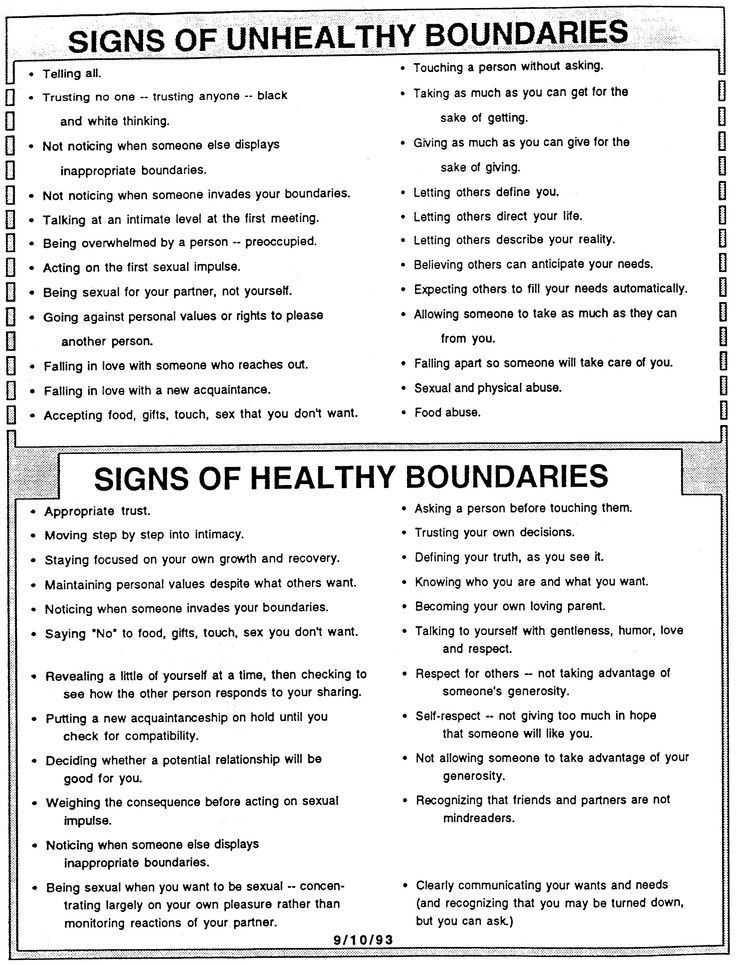 What if he comes back?"
What if he comes back?"
Where are the boundaries in a healthy relationship and how to build them
What healthy boundaries look like in a couple
- We have the right not to want what our partner wants and want something else. You can refuse an offer to go for a walk together or watch a series, and the refusal will be respectfully accepted. nine0076
- Our things are not taken without asking. We can ask our partner to stop doing things to us that we don't like, and they will stop. For example, don't slap on the butt, turn the music down, or don't sprinkle cheese on our portion of macaroni.
- We firmly state what is unacceptable for us, and the partner takes this into account.
- We make decisions for ourselves. The partner respects them. Decisions concerning both are discussed as equals.
- We can say that we want to be alone with ourselves, this will not be considered a manifestation of dislike. nine0076
- And, of course, our freedom to choose: friends, place of work, clothes, hobbies - is not limited.
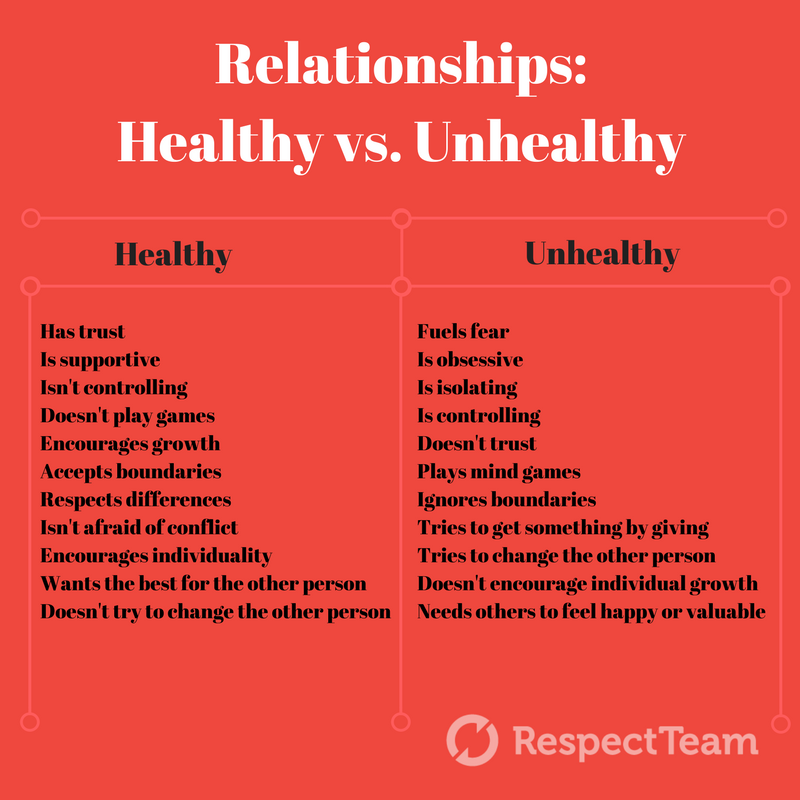
Why is it so difficult to mark your boundaries?
The most common cause of problems is childhood experience. If it was not accepted in the parental family to respect the boundaries of the child and each other, this is perceived as the norm. And when we grow up, it is difficult for us not only to designate our boundaries, but even to notice that they are violated. And it is just as difficult to accept and not violate the boundaries of a partner.
If your parents entered the room to you, a teenager, without knocking, if they could read your personal notes, discuss your secrets and heart affairs with other adults, took your things, did not take into account your desires and plans, if they violated the boundaries of the body, they beat or kissed and hugged against your desire, then you probably have difficulties in adulthood.
Another reason is a strong merger in a pair. At the beginning of a relationship, merging is normal. “I am you, you are me, and we don’t need anyone.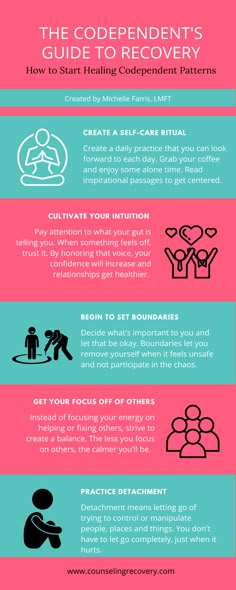 ” "I live with you, I breathe with you, both in a dream and in reality." Strong love does not happen without merging. But at some point, partners need to return to their borders. Sometimes this does not happen, and people feel it: “I have dissolved in the family”, “I feel stuffy, cramped in a couple”, “I seem to be living a life that is not my own”. nine0003
” "I live with you, I breathe with you, both in a dream and in reality." Strong love does not happen without merging. But at some point, partners need to return to their borders. Sometimes this does not happen, and people feel it: “I have dissolved in the family”, “I feel stuffy, cramped in a couple”, “I seem to be living a life that is not my own”. nine0003
Beliefs that love means “all mine is yours” also play a role. That if we are a family, we must do everything together, have everything in common and nothing for ourselves. And to defend oneself is selfishness and lack of love.
It is also difficult to stand up for oneself when the value of the relationship is high and one's own is felt to be low. Relationships matter, but we don't.
How to start building boundaries?
1. You should start by noticing how they are violated. How to notice? Feeling angry. We need anger just to signal that something is going wrong. They treat me inappropriately.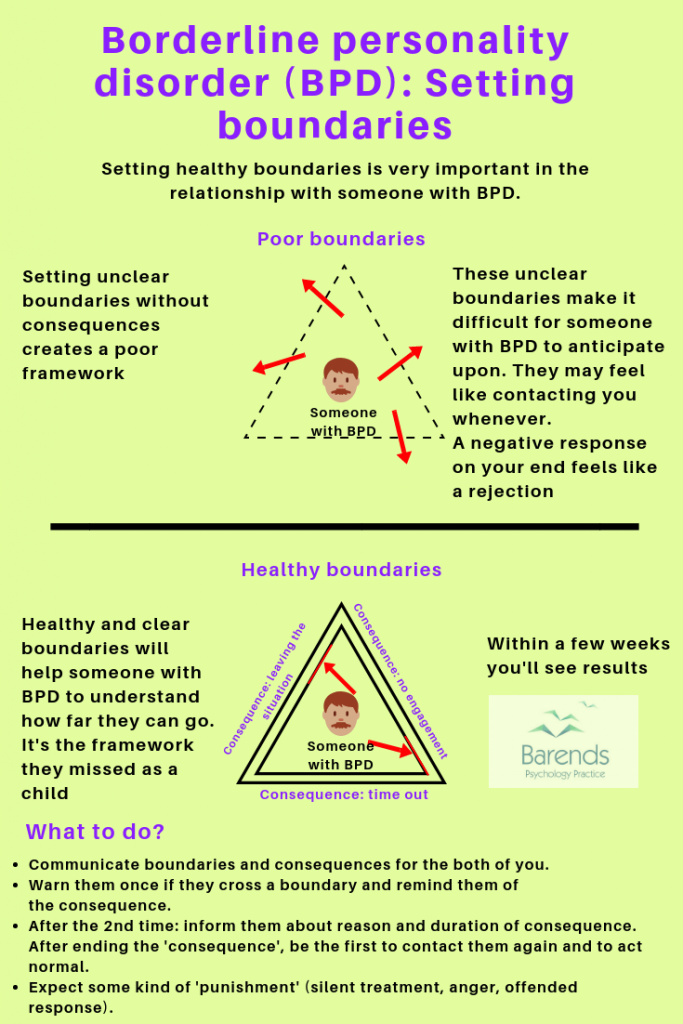 nine0003
nine0003
Have you ever "swallowed" your resentment so as not to quarrel, and then you start to get angry? Or did you agree to something out of a desire to be nice to your partner, and then feel annoyed? Start noticing those moments. So it will become clearer to you at what moments your boundaries are violated, which of them are the most important for you.
2. The next step is to give yourself the inner right to defend your boundaries. It can be scary to ruin a relationship, lose love, become a bitch or a grumbler. It is very important to agree with ourselves: when we understand each other's boundaries, this benefits the relationship, and does not turn it into a never-ending battle. It's not selfish, but respectful and mature. nine0003
3. Then highlight a few points, aspects in which your boundaries are violated. What is the most significant, what especially hurts? For example: "You make our plans for the weekend without asking me what I want.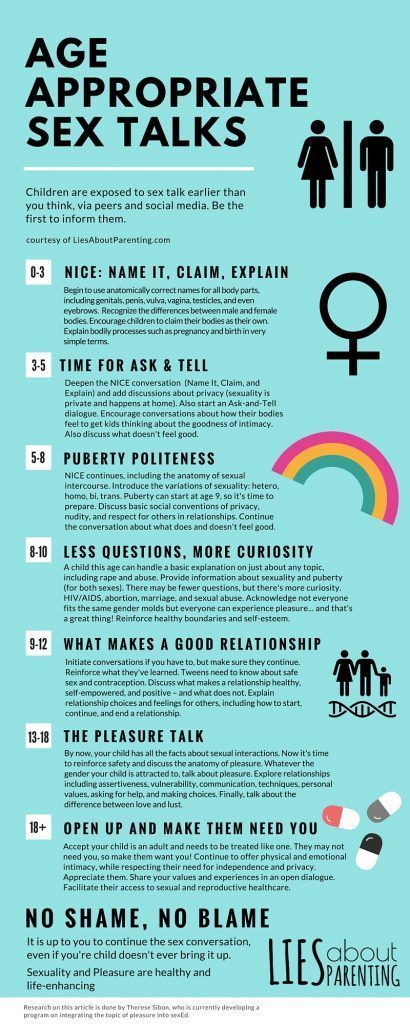 " "You make remarks to me in front of others." "I need time alone with myself, but it's very difficult to tell you about it."
" "You make remarks to me in front of others." "I need time alone with myself, but it's very difficult to tell you about it."
4. It's time to talk. It is better to do this not during a quarrel, but at a calm moment, not attacking, not blaming, but stating. nine0003
The conversation might start like this: “I want to discuss my sweets with you. As you know, I buy myself chocolate halvah as part of my morning ritual. And when I see that you ate everything, I'm offended and I'm angry. It feels like breaking boundaries. Perhaps you don't see any problem with this. But it is important for me that when I wake up, my coffee candy is waiting for me. Please keep that in mind. Don't eat the last halva."
My partner and I may have different ideas about boundaries and where they are. This is fine. Just a clarification in a calm conversation will help both of us understand how we can live comfortably with each other. nine0003
5. It is important to be reminded of boundaries regularly.